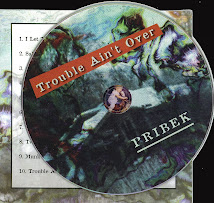
"Spread Out" ... Larry of the Three Stooges
by Pat Darnell
Does anyone remember why Ulysses, by James Joyce was not allowed in the USA back when? I know, you say, just another rhetorical device by me to coax you and others into thinking about what I'm thinking about.
Today I am obsessing over Perception.
In 1920, a literary magazine published the “Nausicaa” episode of Ulysses, in which the hero Leopold Bloom masturbates while watching a young woman display a bit of undergarment. The New York Society for the Suppression of Vice initiated a prosecution under the state’s obscenity law.That was 1920, everything was eat up with bad
The trial judges were not impressed by expert testimony that described Ulysses as a brilliant work. One of the judges refused to allow passages to be read aloud in court because there were females present (including the magazine’s editors). “Nausicaa” was ruled obscene, and Ulysses was banned in the United States. ... Read More HERE ...
 press. Oh, but wait, in 1933 "Random House challenged" the first ruling, brought the book in to the USA and those books were "seized by US Customs." This led to a second "trial" over the "obscenity value" perception of Ulysses to its readers:
press. Oh, but wait, in 1933 "Random House challenged" the first ruling, brought the book in to the USA and those books were "seized by US Customs." This led to a second "trial" over the "obscenity value" perception of Ulysses to its readers: "The bans were usually based on state or federal obscenity law. But what was “obscenity,” and how were prosecutors, courts, and publishers to identify it? An English judge defined obscenity in 1868 as material that tends to “deprave and corrupt those whose minds are open to ... immoral influences” and that suggests to “the young of either sex ... thoughts of a most impure and libidinous character.” [this three-elephant elephantine subject] Courts in the U.S. followed this test for most of the next century.This is a hidden element of literature, which requires deliberate planning to achieve a deadline of publication. Readers have a choice to purchase, to read, to discard... and to meet in drunken symposiums for a beer and robust coffee, and some brisk critique of the future of Obscenity. One hundred years to diffuse a vaporous arguments, and emit cross cultural
 support or disapprove discussions and challenges by large company's, like Random House, from 1868 to 1968:
support or disapprove discussions and challenges by large company's, like Random House, from 1868 to 1968:But the problem of shielding minors remained. In 1968, the Supreme Court attempted to resolve it by inventing a “variable obscenity” rule under which “girlie magazines” and similar materials, even though protected by the First Amendment, lost that protection if distributed to minors.1968 -- Variable Obscenity: is that like asking at the end of the battle: "General, Sir, do we kill all the prisoners?"
By careful planning, initiated by President Dwight D. Eisenhower, in 1969 the USA conquered a myth about our closest satellite -- the moon -- by landing on it and returning with materials ... :: Did those materials make it through customs, or were they tagged as obscene to young minds? Moon rocks... not only foreign material on earth's soil, but unattainable by young minds. Or as unattainable as the Dead Sea Scrolls...
Ulysses is attainable to young minds?
Am I losing my mind over my own entire lifetime -- or did Eisenhower have the best interest at heart when he left his plans up to my generation to act on them? Regardless of our particular orthodoxies and Protestant meanderings, our path to wisdom lies in manipulation of the current or "state of the art" medium used i freedom of speech. Besides there is no present like the future... eh?
Again quoting The Free Expression Project:

The opinion in Burstyn v. Wilson first did away with the archaic ruling that cinema was not protected by the First Amendment; then ruled that “sacrilege” was not a permissible censorship standard. The word is too vague, the Court said, setting the censor “adrift upon a boundless sea amid a myriad of conflicting currents of religious views, with no charts but those provided by the most vocal and powerful orthodoxies.” But the Court left open the question whether states could impose prior censorship under a law designed “to prevent the showing of obscene films.”NEXT: Part Two, "What are we doing with the Internet that makes all
 this discussion MOOT?"
this discussion MOOT?"





No comments:
Post a Comment